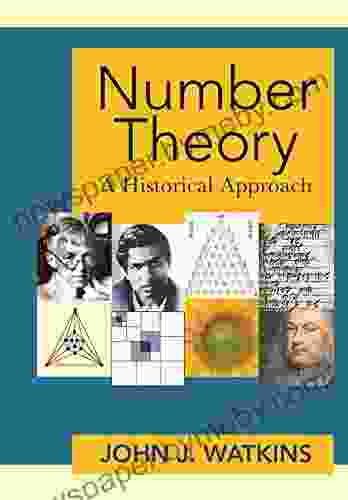Number Theory: A Historical Approach

Number theory is the study of the properties of positive integers. It is one of the oldest and most fundamental branches of mathematics, dating back to the ancient Greeks. Number theory has applications in many areas, including cryptography, computer science, and physics.
The History of Number Theory
The history of number theory can be traced back to the ancient Greeks. The Greek mathematician Pythagoras (c. 570-495 BC) is credited with discovering the Pythagorean theorem, which states that in a right triangle the square of the hypotenuse is equal to the sum of the squares of the other two sides. This theorem is one of the most fundamental results in number theory.
4.2 out of 5
| Language | : | English |
| File size | : | 16737 KB |
| Screen Reader | : | Supported |
| Print length | : | 592 pages |
Other Greek mathematicians who made significant contributions to number theory include Euclid (c. 300 BC),who wrote the Elements, a treatise on geometry that includes a number of results on number theory; and Diophantus of Alexandria (c. 250 AD),who wrote the Arithmetica, a collection of problems on number theory.
In the Middle Ages, number theory was studied by Arab mathematicians such as al-Khwarizmi (c. 800 AD) and Omar Khayyam (c. 1100 AD). Al-Khwarizmi wrote the Algebra, a treatise on algebra that includes a number of results on number theory. Omar Khayyam wrote the Treatise on the Division of Inheritances, a treatise on number theory that includes a number of results on the distribution of prime numbers.
In the Renaissance, number theory was studied by European mathematicians such as Pierre de Fermat (c. 1600 AD) and Leonhard Euler (c. 1700 AD). Fermat is famous for his Last Theorem, which states that there are no positive integers a, b, c, and n such that a^n + b^n = c^n for n > 2. Euler is famous for his work on the Riemann zeta function, which is a function that is used to study the distribution of prime numbers.
Applications of Number Theory
Number theory has applications in many areas, including cryptography, computer science, and physics.
In cryptography, number theory is used to develop codes that are used to protect information from unauthorized access. For example, the RSA encryption algorithm is based on the difficulty of factoring large numbers.
In computer science, number theory is used to develop algorithms for solving a variety of problems, such as finding the greatest common divisor of two numbers or finding the prime factorization of a number.
In physics, number theory is used to study the properties of elementary particles. For example, the Standard Model of particle physics is based on the group theory of the Lie group SU(3) x SU(2) x U(1).
Number theory is a fascinating and challenging branch of mathematics with a long and rich history. It has applications in many areas, including cryptography, computer science, and physics. If you are interested in learning more about number theory, I encourage you to read the book Number Theory:
4.2 out of 5
| Language | : | English |
| File size | : | 16737 KB |
| Screen Reader | : | Supported |
| Print length | : | 592 pages |
Do you want to contribute by writing guest posts on this blog?
Please contact us and send us a resume of previous articles that you have written.
 Book
Book Novel
Novel Page
Page Chapter
Chapter Text
Text Story
Story Genre
Genre Reader
Reader Library
Library Paperback
Paperback E-book
E-book Magazine
Magazine Newspaper
Newspaper Paragraph
Paragraph Sentence
Sentence Bookmark
Bookmark Shelf
Shelf Glossary
Glossary Bibliography
Bibliography Foreword
Foreword Preface
Preface Synopsis
Synopsis Annotation
Annotation Footnote
Footnote Manuscript
Manuscript Scroll
Scroll Codex
Codex Tome
Tome Bestseller
Bestseller Classics
Classics Library card
Library card Narrative
Narrative Biography
Biography Autobiography
Autobiography Memoir
Memoir Reference
Reference Encyclopedia
Encyclopedia Pat Mills
Pat Mills Melissa Shook
Melissa Shook John Cooper
John Cooper T M Cromer
T M Cromer John Michael Rivera
John Michael Rivera Richard Mayhew
Richard Mayhew Rico Austin
Rico Austin John C Bogle
John C Bogle Sj Bennett
Sj Bennett Jim Lamarche
Jim Lamarche Jim Van Houten
Jim Van Houten Marvin Scott
Marvin Scott John Ketwig
John Ketwig Riley Sager
Riley Sager Paul Harvey
Paul Harvey Nkechi Taifa
Nkechi Taifa Joan D Stamm
Joan D Stamm John L Field
John L Field Jo Watson Hackl
Jo Watson Hackl William Ayers
William Ayers
Light bulbAdvertise smarter! Our strategic ad space ensures maximum exposure. Reserve your spot today!

 Darrell PowellSeason of Hunting Stories: A Literary Adventure into the Untamed Wilderness
Darrell PowellSeason of Hunting Stories: A Literary Adventure into the Untamed Wilderness
 Robert FrostUnveiling Strange Tales of Alaska Slim Randles: A Literary Adventure into the...
Robert FrostUnveiling Strange Tales of Alaska Slim Randles: A Literary Adventure into the...
 Shaun NelsonFrom Unexplained Infertility to Fibroids, Endometriosis, PCOS, and Blocked...
Shaun NelsonFrom Unexplained Infertility to Fibroids, Endometriosis, PCOS, and Blocked... Greg FosterFollow ·15.8k
Greg FosterFollow ·15.8k Derek CookFollow ·18.9k
Derek CookFollow ·18.9k John SteinbeckFollow ·9.5k
John SteinbeckFollow ·9.5k Yasushi InoueFollow ·15.5k
Yasushi InoueFollow ·15.5k Richard SimmonsFollow ·7.6k
Richard SimmonsFollow ·7.6k Isaias BlairFollow ·17.9k
Isaias BlairFollow ·17.9k Ibrahim BlairFollow ·13.6k
Ibrahim BlairFollow ·13.6k Nikolai GogolFollow ·17.4k
Nikolai GogolFollow ·17.4k

 Jermaine Powell
Jermaine PowellThe Ultimate Guide to Unlocking Consistent Profitable...
Introducing the 2nd Edition of the...

 Yasunari Kawabata
Yasunari KawabataMinute Microskills Videos: The Ultimate Guide for Visual...
Unlock Your Potential with Bite-Sized Video...

 Nathan Reed
Nathan ReedUnveiling the Wonders of Yosemite through John Muir's...
Immerse yourself in the breathtaking beauty...

 Gabriel Garcia Marquez
Gabriel Garcia MarquezWhen You Find Me Novel: A Gripping Mystery Unravels
In the sleepy...

 Esteban Cox
Esteban CoxMountains of California: An Essential History of...
From the towering...

 Devin Ross
Devin RossComm Check: Unveiling the Heartbreaking Final Flight of...
Comm Check: The Final Flight of Shuttle...
4.2 out of 5
| Language | : | English |
| File size | : | 16737 KB |
| Screen Reader | : | Supported |
| Print length | : | 592 pages |






